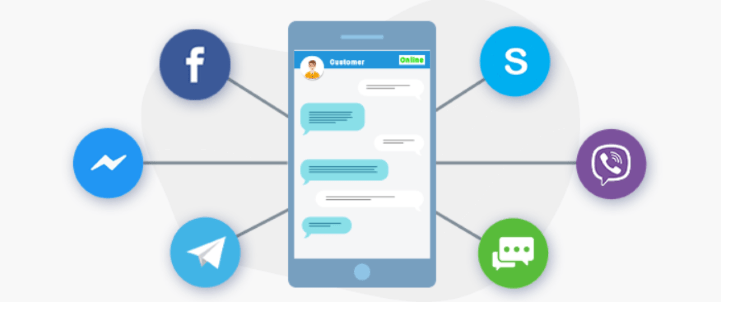REVE Chat Version 4.0
Version 4.0
Upgrade your website to an IM platform & beyond
Blending the strengths of IM and Live Chat
Upgrade your website to an instant messaging platform and beyond


Do you wait for customers to reach out to you with their problems? You should not because 87% of customers expect to be proactively reached out to by brands for customer service-related issues.
The right approach obviously is to make the first move, take the effort and go the extra mile to make customers happy.
By adopting a proactive customer service approach, a business is able to not only anticipate but also resolve the problems in the preliminary stage itself. This puts less pressure on the support team and increases customer loyalty.
And taking the effort shows that you as a business are proactive and understand your customer’s issues even before they become problems. It means, your business needs to be prompt in identify, resolve customer issues, and ensure great experiences.
Your business however can never go a step ahead of customer issues unless it fully grasps the concept of proactive customer support.
Proactive customer service means anticipating and identifying potential customer issues and addressing them proactively before they face them.
A proactive approach can take many forms, right from getting customer feedback to joining forums to creating knowledge bases to using FAQs to leveraging live engagement tools, and face-to-face visits, etc.
In order to develop a proactive customer service strategy, we need to consider the key aspects.
A faster response is a key ingredient of superior customer service as 40% of customers want companies to focus on taking care of their needs quickly. They also expect businesses to show a willingness to help even before an issue occurs.
You need to know why is being proactive important can help on many levels:
Following a proactive approach is a vital part when you think about customers’ delight. When businesses are familiar with reactive vs proactive customer service, it will be able to better serve customers and enhance their experience with your brand.
Proactive support is the modern approach to handle customer problems and offer solutions. Its key advantages are:
Reactive support is the traditional approach to handling customer problems and offering solutions. Its downsides include:
A proactive customer service approach provides ample opportunities to meet customer expectations and strengthen client relationships. It helps your business boost the value of your customers and deliver an excellent experience. Implementing a proactive approach often requires a strong customer experience strategy, as well as an investment in new technologies.
Here is a list of tips and best practices to be followed for a successful proactive customer support strategy.
Let’s dive deep into each of the ways to understand how to implement a proactive customer support strategy:
82% of customers consider a quick response very important when asking a customer service question. Live chat support is a dynamic way to interact with your customers and provide instant sales and support assistance
Live chat helps to understand customers’ pain points and provide the help that aligns with their expectations, which improves customer experience. It makes every customer interaction is an opportunity to build longer relationships and you can leverage it to achieve better customer satisfaction and higher sales.
Betterment, a leading online investment advisor, leverages the power of proactive chat offers to let their advisors provide quick and personalized financial services to new clients.
46% of customers leave a website in case they’re not able to find what there are looking for.
To avoid such a situation, you should consider helping your customers instantly with co-browsing which is a software-driven technique that helps solve the customer issue by using their web browser.
Co-browsing is a great way to offer real-time support to customers who face problems in filling up forms or other personal details.
Your customer service agent can easily connect with customers and start co-browsing by sharing PC screens. Doing this can reduce response time and increase customer satisfaction.
Businesses that give priority to customer experience (CX) achieve higher revenue than their competitors. And chatbots help a lot when it comes to prioritizing your customer service.
80% of businesses today deploy some form of chatbot across their sales, support, or marketing departments.
You can use AI bots to hold real-time conversations with customers and increase engagement. The best part, chatbots can provide 24×7 support even when you or your team members aren’t available.
Sephora is a cosmetic brand that has implemented a chatbot in partnership with Kik messaging application. It gives customers an opportunity to use the chatbot to ask for makeup recommendations or request product reviews and get relevant products or videos.
Visual engagement is a hot trend in the industry to achieve higher customer service standards and improve customer experience. In fact, the use of video chat for customer service can help make conversations interactive and personalized.
Brands that use video chat for customer support find it easy to deliver faster responses that boost customer satisfaction and improves brand credibility. Video chats are always greatly helpful to ensuring a delightful user experience.
Goldsmiths is a well-known jewelry brand that uses live chat with voice and video chat support for better customer communication. This feature helps it mimic the personal service that it offers in its physical stores.
Not all your customers would like to call the customer service team or email you when they have questions or doubts. Many prefer to find answers to their problems themselves and this is where knowledge bases make their presence felt.
51% of customers prefer technical support through a knowledge base.
Knowledge bases are the best tool for offering proactive support. You can create a knowledge base that contains it information about your company, products/services, or anything that customers may be interested in.
Adopting this approach means you’re proactive in terms of customer service and are ready to offer help in the early stage itself.
Shipt is a grocery and alcohol delivery app that has a simple yet effective on-brand knowledge base with several categories to help its customers with their problems.
57% of customers will give up on an online purchase altogether if finding the answer to their question proves too difficult.
It is one of the big risks for businesses that can’t be afforded. Hence, having a knowledgeable team for both sales and customer support results in enhanced customer trust on a one-to-one level.
For example, Debenhams, the UK Retailer offers online buying guides via its website. Such services drastically reduce the rate of exchanges and returns while also saving on costs and freeing up resources.
Customers choose their own preferred channel to connect with brands. They can use either website, social media, Facebook messenger, etc., or any other channel to reach out to your business.
So, you need to be where your customers are to deliver the best omnichannel customer experience no matter how a customer reaches out. This approach can prove very helpful when you want to improve your online customer service.
Amazon for example anticipates questions on delivery dates and times, notifying customers in advance of any delays via email.

Giving customers what they want is always the foundation of good customer service. And without knowing what your customers want, you would never be able to meet their expectations fully. To find out what customers want, there is no better way than to learn how to ask for customer feedback.
You need to frequently check in with the customers to timely identify issues and then take the right measures to fix them. This is where collecting feedback from your customers helps a lot as it prepares you for the challenges that need resolution.
Deezer is one of the leading music streaming sites in the world and is a great example of how to get your customer feedback right. It has created a community to let consumers talk to one another about music and boost the engagement level.
Great customer support is not possible unless there is a sync between different teams and departments. In fact, one of the key aspects of well-defined internal processes is to keep your team on the same page with a clear idea of what needs to be accomplished.
All your processes and teams across marketing, sales, or product must provide real value to customers and enhance their experience. For this, your information must be updated as well as organized.
Introducing a recommendation feature is a form of offering proactive customer service as you’re going a step ahead to enhance their experience. When a recommendation is offered, it saves customers from searching for new products and it also gives an option to consider.
These recommendations can be based on individual buyer behavior or you can also use algorithms to better understand the patterns behind previous purchases. When you recommend things, customers get the feeling that you care and they may also feel encouraged to make an additional purchase.
Disney Hotstar is a popular streaming platform with a huge database of movies, shows, TV programs, and sports documentaries. Its recommendation feature which is based on user’s past history and search preferences is one of the top reasons behind ever-growing hours of content consumption by users.
Proactive service is the feature of customer support as it can help improve customer experience and engagement. This approach can win your customer’s trust and set your business up to prioritize customers and solve issues before they become a problem.
Your business can seek customer feedback, create a knowledge base, devise an omnichannel strategy, provide real-time support to answers common questions and handle pain points before they become a problem. So, implement a proactive customer service strategy to delight your customers and turn them into brand ambassadors.
Start a 14-day free trial, no credit card required
Stay updated with the latest trends and ideas we share
What happens when your business doesn’t have a well-defined lead management process in place? You might then struggle to track,...
In your business, you need information about your customers’ pain points, preferences, requirements, and most importantly their feedback. Now think this...
How does the future look like to you with Artificial Intelligence shaping most of our day-to-day tasks? Sometimes it feels...


